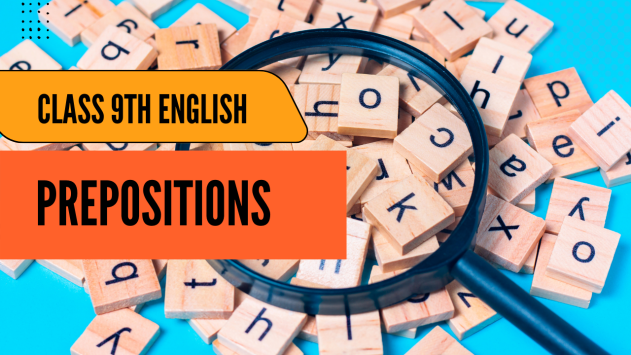We have shared Class 9th Prepositions English to help the students with the basic grammar skills and improvement in their overall vocabulary. Prepositions are a very important part of Basic English grammar and we have to make sure to give you the best in just one article along with the basic details of various prepositions and how to use them with different words.
We have also shared a list of various Prepositions Class 9th followed by some common words to be able to help the students to get the words clear and make them understand the chapter Prepositions Class 9th very clearly.
Prepositions Class 9th: Introduction
A preposition is a word placed before a noun or a pronoun to show in what relation the person or thing denoted by it stands in regard to something else.
A preposition is a word (or group of words) used especially before a noun or pronoun to
show place, position, time, etc.
AFTER
Part I, later than
1. I shall meet you after Monday.
2. He came after 3 p.m.
Part II, behind (movement)
1. The police ran after the thief.
BEFORE
Part I, earlier than
1. Please meet me before 6 p.m.
2. I shall complete this work before June.
3. He arrived before me.
4. I put my work before everything.
Part II, in front of
1. Mohan was brought before the principal.
2. He made a statement before the police.
AMONG/AMONGST, in the middle (more than two)
1. He distributed toffees among children.
2. I have to deliver a speech among them.
3. You should work among the poor.
4. Who amongst you are ready to go there?
BETWEEN, in the middle (only two)
1. He distributed mangoes between Meena and Rajni.
2. There was no agreement between workers and management.
3. Meet me between 7 to 8 am.
ON
Part I, on something
1. The books are on the table.
2. There is no nameplate on the door.
3. Let’s sit on the grass.
4. Don’t hit anybody on the head.
Part II, day and date
1. I shall come to meet you on Monday.
2. He will return this money on 5th September.
3. He reached on the morning of 9th June.
Misc.
• He has gone to Mumbai on business.
• Are you going on picnic?
• On reaching home he called his friend.
• He read a lesson on philosophy.
• This car runs on patrol only.
• He was arrested on a charge of cheating.
• Nine percent interest will be charged on loan.
• They live on bread and tea.
• Is he on leave now-a-days?
• The factory was on fire.
UPON, on (movement)
1. He threw books upon the table.
2. The tiger jumped upon the jackal.
3. The last date of income tax payment is almost upon us. (very near)
IN
Part I, inside
1. They are sitting in the room.
2. There is no pencil in the box.
in the street, in the sky, in the newspaper, in the bed, in the fire, etc.
Part II, with countries and big cities etc.
1. He lives in Delhi.
2. They opened a shop in America.
3. It is the highest mountain in the world.
Part III, time
1. He will complete this work in three months.
2. We shall buy a new car in October.
in the morning, in the afternoon, in the evening, in the night, in the past, in 2001, etc.
Misc.
• He has faith in God.
• They were bathing in the river.
• They are interested in reading books.
• He has spent his life in politics.
in uniform, in the rain, in English, in ink, in groups, in rows, in two parts, in
thousands, in cash, in loud voice, in business, etc.
INTO, movement from outside to inside.
1. They went into the room.
2. He poured coffee into the cups.
Misc.
• He translated the story into English.
• Turn this portion into a study room.
• He came into power two years ago.
• Fold the napkins into triangles.
AT
Part I, small cities, town, villages, colonies
1. They live at Sonipat.
2. I live at Moti Nagar.
Part II, age
1. He retired at 56.
2. She wrote her first poem at 9.
Part III, time
1. We reached there at 9 p.m.
2. Do you get up at 5 a.m.?
at dawn, at sunrise, at noon, at sunset, at night
Part IV, near a place or thing
1. Who is standing at the door?
2. They were playing at the river.
3. The students are sitting at the table.
Part V, selling
1. The apples are being sold at Rs.30/- a Kg.
Misc.
• My father is not at home.
• Pakistan and India are at peace.
• Open your book at page no. 23.
• At first they became angry, at last they agreed.
• He aimed at the bird.
• They were gossiping at the corner of street.
at school, at hotel, at head office, at the moment, at the end, at the weekend, at
Christmas, smile at, shout at, at ease, at war, delighted at result, etc.
FROM
Part I, place
1. They have just come from Mumbai.
2. Withdraw money from the bank.
Part II, person
1. You can borrow money from your friend.
2. I have taken this book from Raja.
Part III, time
1. He works from morning till evening.
2. We shall start this work from Monday.
Part IV, source
1. The light comes from the sun.
2. She has taken the story from this book.
TO
Part I, place/direction
1. Who is going to the market?
2. They are going to America in May.
Part II, before a verb
1. He wants to go there.
2. She likes to exercise in the morning.
Part III, time
1. He works from 9am to 7pm.
2. They lived in our house from April 1996 to June 1999.
3. It is ten minutes to five.
Misc.
• She is secretary to the managing director.
• He won by five goals to three.
• Don’t compare it to her.
• I prefer tea to coffee.
• This machine is superior to that.
• There are 100 answers to this question.
• She is devoted to her family.
FOR
Part I, reason, purpose
1. I have bought a gift for you.
2. Can you prepare a cup of tea for me?
Part II, time
1. He has been living here for ten years.
2. We lived there for six months.
Misc.
• They walked for ten miles.
• He bought this book for Rs.200.
• The people mistook him for the minister.
• She is planning to run for the position of Mayer.
WITH, in the company of
Part I, person
1. He is sitting with his friends.
2. Were you quarrelling with your neighbours?
Part II, instruments/things
1. Wear this tie with yellow shirt.
2. Why did you beat him with a stick?
Misc.
• He played with skill.
• I am pleased with your decision.
• We left with our father’s permission.
• My brother is down with fever.
• Everybody grows smarter with age.
• I can complete this work with your help.
• Was the child trembling with fear?
• With all her faults I still liked her.
WITHIN, in the specified period, area etc.
1. He will come back within ten minutes.
2. Did you pay off the loan within a year?
3. He was told to stay within the limits of the ring.
4. The football has to stay within the playing field.
5. Please keep this information within the family.
OF belonging to, concerning
Part I, relation
1. Who is the owner of this car?
2. Has he become the manager of this bank?
3. This is the responsibility of a nurse.
4. The people of this area love to grow plants.
Part II, material
1. The ring is made of gold.
2. I bought a shirt made of cotton.
Misc.
• I have never heard of such a place.
• She is a lover of classical music.
• Mother’s love is necessary for a child.
• Does he have any hope of victory?
OFF
Part I, separation
1. The button of my shirt has come off.
2. He fell off a ladder.
3. Please keep off the grass.
Part II, disconnection
1. Who cut off the telephone wire?
2. Please switch off the T.V.
AGAINST, in opposition, resting on
1. They can’t speak against their leader.
2. He won’t go against your advice.
3. He was leaning against the wall.
BY
Part I, person
1. The tiger was killed by the hunter.
2. This story was written by Premchand.
Part II, transport
1. He will go by air.
2. I sent the documents by mail.
3. They will travel by bus.
Part III, selling
1. Milk is sold by the litre.
2. Bananas are sold by the dozen.
Part IV, time (period)
1. I had completed this work by 5 PM.
2. They will pay off the loan by June.
Misc.
• He walked by me without speaking.
• May I pay by cheque?
• He earns his bread and butter by writing.
• Switch it on by pressing that button.
• You can get promotion by working hard.
• I caught the thief by the neck.
• This room is 15′ by 20′.
• The bullet missed him by one centimeter.
• Is the curtain short by one foot?
• He is an advocate by profession.
• She swore by God.
• He always keeps his dog by his side.
• I am Indian by birth.
WITHOUT, not having
1. You can’t leave a country without a passport.
2. Don’t touch anything without my permission.
3. She posted the letter without a stamp.
4. Never act without thinking about the Consequences.
5. He left without saying a word.
BEHIND, at the back of
1. The thief was hiding behind the door.
2. My house is behind the school.
3. The train is behind schedule.
4. The sun disappeared behind the clouds.
5. My family is behind me in my ambition to become an engineer.
6. India is behind China in terms of international trade.
7. Please tell him to stand behind the counter.
DURING, within a specified period of time
1. They did nothing during the last week.
2. She will complete this course during the summer vacation.
3. Raise this issue during the discussion.
OVER, higher than, above
1. There is no fan over the table.
2. The aeroplane is hovering over our colony.
3. We are passing over London.
4. He jumped over the wall.
Misc.
• They held an umbrella over her.
• Turn over the page.
• He ruled over a great empire.
• He has little control over his emotions.
• Spread a cloth over the table.
UNDER, beneath or below
1. They took rest under a tree.
2. The books are under the pillow.
3. Please push this table under the fan.
Misc.
• The water flows under the bridge.
• Children under the age of four are not admitted.
• He has a staff of ten working under him.
• India was under British rule till 1947.
• Under the terms mentioned earlier, you have to pay the penalty.
• The matter is still under consideration.
• He did it under the influence of his friends.
• Don’t open an account under a false name.
ABOVE, higher than
1. Fix a tube light above the table.
2. There is no map above the chair.
3. His head was above the water.
4. He got above 60% marks.
5. The water came above his knee.
6. We are flying above the clouds.
7. It weighs above 5 kg.
8. She is above suspicion.
9. He must be above 18.
BELOW, at a lower position
1. The valley is below the hill.
2. Don’t write below this line.
3. The temperature will remain below the freezing point.
4. His rank is below an inspector.
5. He got below 50% marks.
ACROSS
Part I, from one side to another side
1. Can he swim across the river?
2. The child ran across the ground.
3. Draw a line across the page.
Part II On the other side
1. My house is across the street.
2. Please wait for me across the road.
ABOUT, relating to, on the point of, almost going to
1. Do you know anything about him?
2. I have no knowledge about it.
3. They are about to go.
4. The movie was about to start.
5. Has he written a book about China?
TOWARDS, in the direction of
1. They ran towards the crossing.
2. He hit the ball towards the goal.
3. It is the first step towards greater unity between India and Pakistan.
4. Parents should be friendly towards their children.
THROUGH, to go in from one side and come out from the other side of
1. The tiger jumped through the ring.
2. They went through a tunnel.
3. The river Yamuna flows through Delhi.
4. The boys ran through the street.
5. I came to know about this computer through a newspaper advertisement.
6. The wind swept through the garden.
ALONG, on a course parallel to
1. We can go along this wall.
2. They went along the track/canal.
3. Let’s have a stroll along the river bank.
ALONG WITH, in addition to
1. The company is giving a DVD free along with this television.
2. I gave him a pen along with the book.
SINCE, (point of time)
1. It has been raining since morning.
2. He has been living in Delhi since 1987.
3. I haven’t visited him since his last birthday party.
BESIDE, at the side of, next to, near
1. You may sit beside me.
2. Please keep this chair beside the bench.
BESIDES, in addition to
1. Besides vegetables she bought apples.
2. Besides a car they also have a bike.
UP, from a lower to a higher point
1. Why are they going up the hill?
2. Climb up these stairs.
DOWN, from a higher to a lower point
1. They ran down the slope.
2. The rock rolled down the hill.
3. Her hair were hanging down.
ON TO, moving to a position on
1. He climbed onto the horse.
2. He moved the books onto the third shelf.
AMID/AMIDST/IN THE MIDST OF, in the middle of, surrounded by
1. Amid the noise I was unable to hear anything.
2. It was difficult for him to work in the city amidst such circumstances.
3. Amid confusion she lost her way.
4. In the midst of clappings he announced this scheme.
BENEATH, to a lower position
1. There was a toy beneath the books.
2. I can’t do this work as it is beneath my dignity.
3. The boat sank beneath the waves.
BEYOND, on the for side of
1. It was beyond his power.
2. The kidnappers have gone beyond the reach of the police.
3. This bike is beyond repair now.
4. Don’t study beyond midnight.
AROUND, on all sides
1. They drove around the city.
2. Build a wall around this garden.
Preposition Phrase
A prepositional phrase is a group of words containing a preposition, a noun, or a pronoun
the object of the preposition, and any modifier of the objects. It is useful to locate prepositional phrases in a sentence since any noun a pronoun within the prepositional phrase must be the preposition A’s object and therefore cannot be misidentified as a verb A’s direct object.
Prepositions Class 9th: Mind Maps
We provide you with Prepositions Class 9th Mind maps to help you all with the concepts of Prepositions class 9th at a glance so that the concepts become pristine to all. Mind maps are very useful to make the concepts clear at one glance and students are able to understand everything.
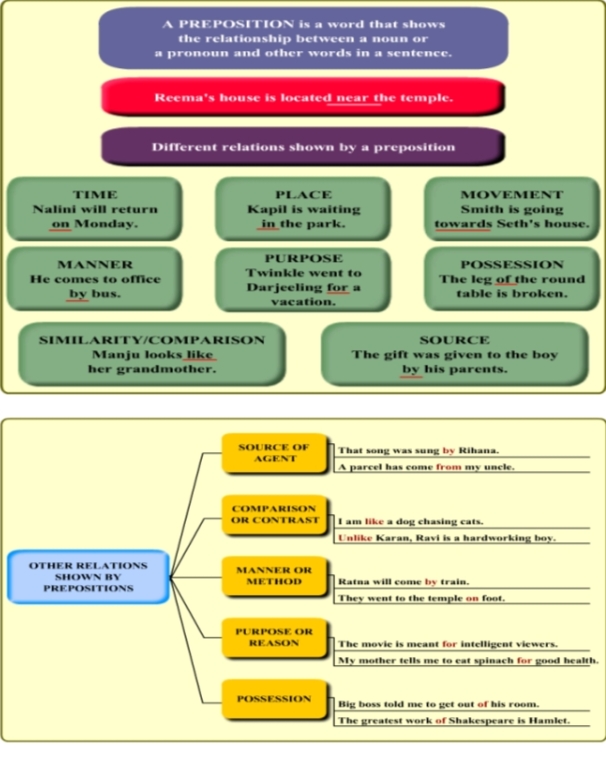
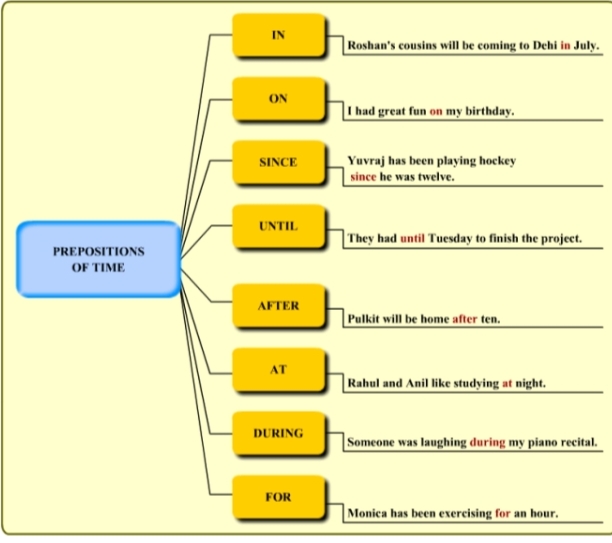
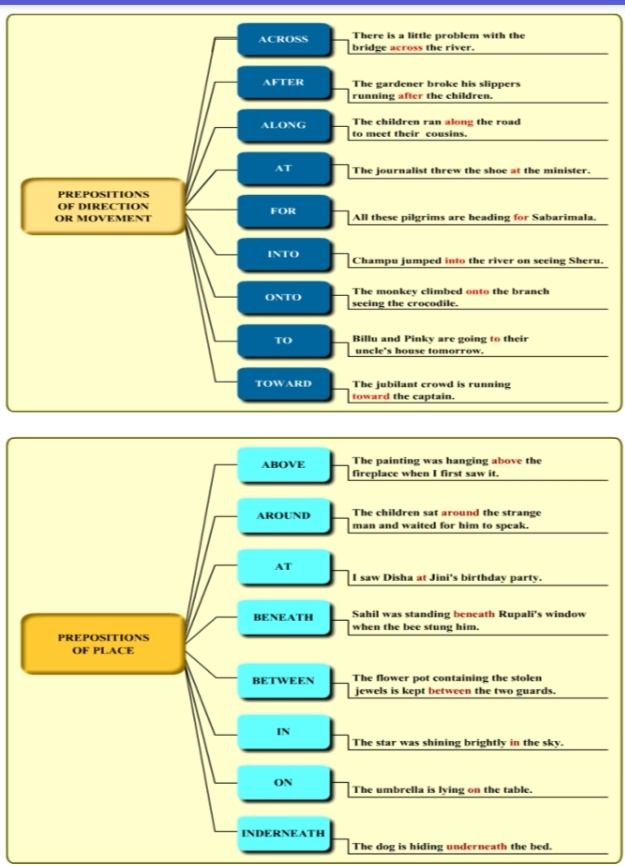
Prepositions Class 9th: Solved Exercises
Question 1.
Choose the correct prepositions.
(i) What are you doing _____________ the weekend?
(ii) I don’t know yet. Maybe I’ll go to the cinema _____________ Saturday.
(iii) That’s interesting. I haven’t been to the cinema _____________ so many years.
(iv) We could go there together _____________ the afternoon.
(v) That would be great. But I would prefer to go there _____________ the evening. I am
visiting my grandma ____________ Saturday. (vi) That’s okay. The films starts
_____________ eight o’clock.
(vii) I can pick you up half _____________ seven. How long does the film last?
(viii) It lasts _____________ two hours and forty-five minutes.
(ix) _____________ two hours and forty-five minutes.
(x) _____________ eight _____________ a quarter _____________ eleven.
(xi) That’s right. But I must hurry home _____________ the film. I have to be home
_____________ eleven o’clock.
Answer:
(i) at
(ii) on
(iii) for
(iv) in
(v) in, on
(vi) at
(vii) an past
(viii) for
(ix) for
(x) From, till, to
(ix) after, by
Question 2.
A Photograph
Complete the exercise with the correct prepositions.
(i) I got these photos _____________ my friend Jane.
(ii) These photos were taken _____________ her boyfriend, who is a hobby photographer.
(iii) _____________ these pictures you can see a giraffe.
(iv) So, these are pictures _____________ a giraffe.
(v) Look _____________ these pictures. Aren’t they wonderful?
Answer:
(i) from
(ii) by
(iii) In
(iv) of
(v) at
Question 3.
Complete the exercise according to the picture.
(i) The first Mc Donald’s restaurant was opened _____________ Dick and Mac McDonald
the 15th _____________ May 1940.
(ii) The best selling products _____________ their restaurant were hamburgers.
(iii) So the McDonald brothers thought _____________ a way to produce hamburgers
more quickly
(iv) This was introduced _____________ 1948 and became known _____________ the
Speedee Service System.
(v) The first franchised McDonald’s restaurant was opened _____________ 1953, and
today you can find Mcdonald’s restaurants _____________ more than 100 countries.
(vi) The meats _____________ the burgers vary _____________ the culture _____________ the
country.
(vii) Franchisees and future managers _____________ McDonald’s restaurants are trained
Humburger University, which is.located _____________ Oak Brook, a suburb _____________
Chicago.
(viii) McDonalds is also known _____________ its sponsorship _____________ various
international sports events.
Question 4.
Fill in the blanks with correct prepositions.
(a) Sheeba was born ……………………. the year 1985.
(b) They are going to meet ……………………. lunch in the afternoon.
(c) Try not to compromise ……………………. your principles.
(d) My father is very fond ……………………. sweets.
(e) He has not yet recovered ……………………. his illness.
(f) He rules ……………………. a vast empire.
(g) I have not slept ……………………. yesterday.
(h) The man walked ……………………. the house.
(i) The sweets were distributed ……………………. the children at the party.
(j) Rajesh has returned almost ……………………. a month.
Answer:
(a) in
(b) at
(c) on
(d) of
(e) from
(f) over
(g) since
(h) around/towards
(i) among
(j) after
Question 5.
(a) Meenal has achieved a lot in her life but she cannot be given the credit (i) …………………….
all that she boasts (ii) …………………….
(b) Sandwiches are snacks made (i) ……………………. bread and some filling (ii) …………………….
it.
(c) There is a playground (i) ……………………. our house where children play (ii) …………………….
the evening.
(d) The program begins (i) ……………………. an hour and I have to be there (ii) ……………………. 6
p.m.
(e) The class was divided (i) ……………………. two groups and each group had (ii) …………………….
vote a leader (iii) ……………………. themselves who would represent them (iv) ……………………. the
class debate (v) the annual function.
(f) I reached the party (i) ……………………. time but there was nobody (ii) …………………….
welcome me.
(g) He agreed (i) ……………………. my proposal and also agreed (ii) ……………………. what I had
said.
(h) (i) ……………………. displaying his presence of mind, he was able to kill the snake (ii)
……………………. an iron rod.
Answer:
(a) (i) for (ii) about
(b) (i) of (ii) in
(c) (i) near/ outside (ii) in
(d) (i) in (ii) by
(e) (i) into (ii) to (iii) for (iv) in (v) at
(f) (i) on (ii) to
(g) (i) to (ii) to/with (h) (i) By (ii) with
Question 3.
(a) Raman fell (i) ……………………. the soft grass (iii) ……………………. his way back home (iv)
……………………. school (v) ……………………. 4 p.m.
(b) I would like (i) ……………………. help her (ii) ……………………. her studies as she has her test (iii)
……………………. Monday.
(c) He is the thief the police were looking …………………….
(d) Cheating was being done …………………… the very nose of the invigilator.
(e) This is difficult work and is …………………… his capacity.
(f) He goes to his office (i) …………………… foot but sometimes goes (ii) …………………… cycle also.
(g) Make sure that when I return, the room is free …………………… dirt.
(h) Raj an fell straight (i) …………………… a ditch and could not get out (ii) …………………… it (iii)
…………………… his own.
(i) The guests preferred vegetarian food (i) …………………… non-vegetarian food, so the cook
prepared a dish made (ii) …………………… fresh vegetables (iii) …………………… aromatic spices.
(j) She went and sat (i) …………………… her grandmother (ii) …………………… listen (iii)
…………………… a story.
Answer:
(a) (i) with (ii) on (iii) on
(b) (i) to (ii) in (iii) on
(c) for
(d) under
(e) beyond
(f) (i) on (ii) by
(g) of
(h) (i) into (ii) of (iii) on
(i) (i) to (ii) with (iii) in
(j) (i) beside (ii) to (iii) to
Prepositions Class 9th: List Of Words Followed By Prepositions
We have shared Prepositions Class 9th list of words followed by prepositions to help the students to know about some verbs and words that are followed by the fixed prepositions.
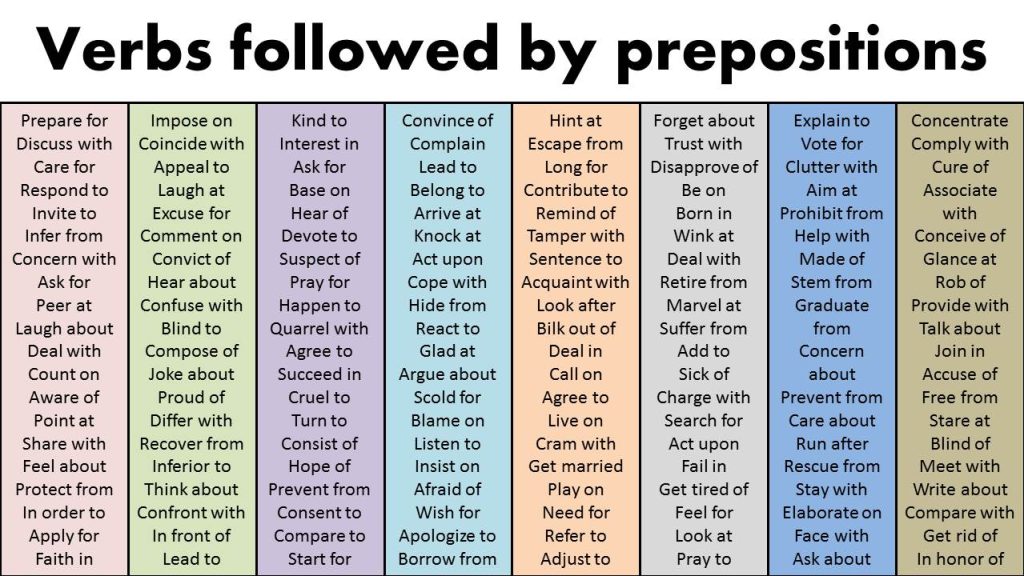
Conclusion
We have shared Class 9th Prepositions English to help the students with the basic grammar skills and improvement in their overall vocabulary. We have to make sure to give you the best in just one article along with the basic details of various prepositions and how to use them with different words.
We have also shared a list of various Prepositions Class 9th followed by some common words to be able to help the students to get the words clear and make them understand the chapter Prepositions Class 9th very clearly.

